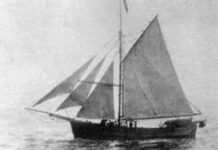Captain Joshua Slocum was a native of Nova Scotia, whose inhabitants have a reputation for being a hardy breed, and they didn’t come much hardier than him. This was a man who could not only build a ship himself, but also a house to live in while he did it. That was in the jungle 60 miles from Manila in the Philippines. This meant starting from scratch, cutting down the trees and sawing them into planks and steaming the planks into shape.
He’d always been a confident character. Aged 12 he was caught making a model ship when he should have been grading potatoes. He was beaten by his farmer father, who smashed the model. Young Joshua ran away to sea. And he sailed all over the world: China, Australia, Japan, Russia, South America.
Sailing freighters redundant
But in the late 1880s and early 1890s things got bad for sailing freighters as the steamers were taking over. The tall sailing craft were being cut down and turned into barges. Slocum thought he should leave the sea but could not think of what to do. Then he had his great idea. He would sail alone around the world – at the age of 51.
A captain he knew offered to give him a boat. The Spray was a wreck lying in a field near Boston. Slocum rebuilt her, again cutting trees and sawing and shaping the planks. He created a pretty and extremely seaworthy vessel 36ft 9ins long and 19ft 2ins wide. And on April 24, 1895, he set sail from Boston on his round-the-world trip, leaving a host of people ashore who were convinced he would never make it. He would make them eat their words.
Ocean navigation
Captain Slocum had the supreme confidence to lash The Spray’s wheel and go below and read and cook and sleep. He had an amazing ability to banish worry and simply cope with anything that happened. And despite his lifetime at sea, he had never learned to swim. He wrote in his book Sailing Alone Around the World, that he “suddenly remembered this” when clinging to the gunwale of a capsizing dory. This was a time with no satellite positioning or radar or radio or rescue helicopters. He navigated using a battered tin clock he bought for $1, the stars and lunar sightings. The Spray delighted him. She would hold her course as though on a rail and beat everything across the Atlantic except the steamers. Over one eight-day period she averaged 150 miles a day.
He admits to being in awe of the magnificence of nature, the sheer power of the open ocean. There was a spiritual side to him. Once, during a bout of delirium, he saw one of Columbus’s crew, the pilot of the Pinta, take over The Spray’s wheel and steer her through the fierce blow. He had a conversation with this bearded spirit, who reassured and comforted him.
Encounters with whales
Slocum appeared to have no fear at all. One day a whale scratched its massive back on the keel of his little wooden boat. Slocum’s reaction? “For broad rippling humour the whale has no equal.” He bore other encounters with whales with the same equanimity. But sharks he hated, as do most sailors. He would shoot or harpoon them. But he wasn’t above using them to make money. In Australia he caught a shark and charged people sixpence to come on board The Spray and another sixpence to see the shark.
Humans were sometimes more of a danger. He had several encounters with pirates. In Tierra del Fuego he had to fight off savage attackers who were known to the authorities and had massacred ships’ crews.
Round-the-world Record
And so after three years sailing, The Spray anchored at Newport on June 27, 1898. Captain Slocum had silenced the doubters and set a record which can never be taken from him. He wrote his book which became a best-seller and enjoyed his success for a time. But the wanderlust he’d always had did not leave him. He cast about for a new project and in 1909, aged 65, he set sail for the Orinoco river and was never seen again.
The course he was on crossed known steamer routes and he could have been run down in the night. A steamer would not even notice the collision with a fragile wooden craft. Or she could have been sunk in foul weather, although with Slocum’s ability and experience that seems unlikely. Or perhaps he had an encounter with a whale with a cruel sense of humour . . .
Source:
- Sailing Alone Around the World by Joshua Slocum







